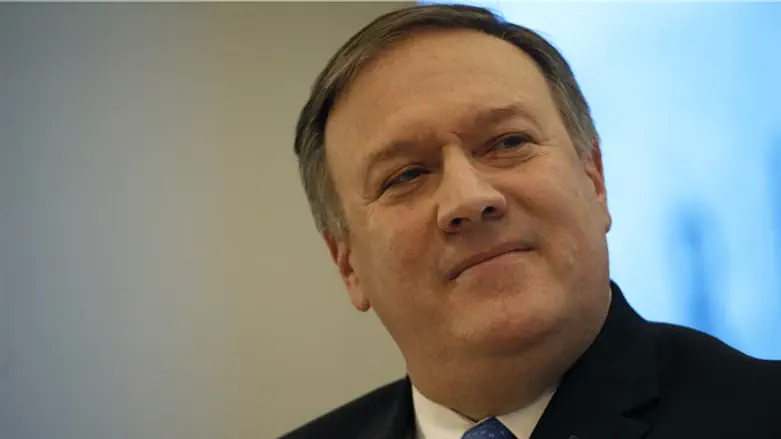
Washington's new chief diplomat lashed out at Iran on Sunday as he met Saudi leaders and headed to Israel to rally opposition to Tehran and brief US allies on US President Donald Trump's threat to quit the Iran nuclear deal.
US Secretary of State Mike Pompeo, who set off on his first diplomatic trip within hours of being sworn in, met on Sunday with Saudi King Salman after arriving in Riyadh and having dinner on Saturday with Crown Prince Mohammed Bin Salman.
Pompeo will arrive in Tel Aviv on Sunday afternoon to meet Israeli Prime Minister Binyamin Netanyahu then head to neighboring Jordan, wrapping up a weekend of talks with some of Iran's most fervent foes in the region.
After the meetings in Riyadh, he accused Iran of destabilizing the Middle East, including through its support for Syria's President Bashar al-Assad and for Shiite rebels in Yemen.
"(Iran) supports proxy militias and terrorist groups. It is an arms dealer to the Huthi rebels in Yemen and Iran conducts cyber-hacking campaigns. And it supports the murderous Assad regime," Pompeo said at a joint press conference with Saudi Foreign Minister Adel al-Jubeir.
"Unlike the prior administration we will not neglect the vast scope of Iran's terrorism."
Trump is due to decide on May 12 whether to reimpose sanctions on Tehran or cancel the 2015 nuclear accord which many see as key to preventing Tehran from gaining atomic weapons.
But Trump and America's Middle East allies argue the deal, approved by Trump's predecessor Barack Obama, was too weak and needs to be replaced with a more permanent arrangement and supplemented by controls on Iran's missile program.
Jubeir said Riyadh supports "efforts aimed at improving the nuclear deal" and called for further sanctions against Iran for its "violations of international decisions on ballistic missiles, its support for terrorism and
its interference in the affairs of countries in the region."
Pompeo said the nuclear deal "in its current form" does not do enough to make sure Iran never possesses atomic weapons, and again suggested Trump was ready to nix the agreement.
"We will continue to work with our European allies to fix that deal, but if a deal cannot be reached, the president has said he will leave that deal," he said.
French President Emmanuel Macron and Germany's Chancellor Angela Merkel left Washington this week after talks with Trump which failed to secure any promise to keep the deal alive.
That may be music to the ears of Saudi and Israeli leaders, who support a tougher line on Iran.
"This administration has made it a priority to address Iran's missile programs," a senior US official told reporters in Riyadh, condemning missile attacks by Yemen's Tehran-backed Huthi rebels on Saudi Arabia.
The latest volley of missiles -- which are in part a response to Saudi air strikes in rebel-held parts of Yemen -- was fired across the border shortly before Pompeo touched down in Riyadh.
US officials travelling with Pompeo told reporters the missiles had been supplied by Iran, citing the attacks as evidence that regional powers should work together.
"Iran supplies the missiles that the Huthis fire into Saudi Arabia, threatening civilians," he said. "Today alone the Saudis shot down four Huthi missiles, the latest in a string of such attacks."
Saudi leaders will welcome US solidarity against Iran, just as Israel will want to see greater US support for its efforts against Iranian influence in Syria and Lebanon.
But Pompeo has come with requests too.
US officials have said that while Riyadh has a right to self-defense, it must come to see that any solution to Yemen's civil war will be a political one and that Saudi-led coalition forces must not exacerbate the massive humanitarian crisis there.
Washington also wants to see an end to the Gulf crisis that has seen Saudi Arabia and regional allies impose a diplomatic and trade embargo on fellow US ally Qatar. And, perhaps most importantly for Trump, Pompeo will urge Saudi Arabia to provide personnel and funding to help US efforts to stabilize northeastern Syria and defeat the remnants of the Islamic State (ISIS) group.
"The president has made clear that he wants to see meaningful participation from states in the region," said another senior US official travelling with Pompeo.
The United States has more than 2,000 troops in Syria.
On Qatar, the US officials said they do not blame one side or the other, but want Riyadh and Doha to resolve the stand-off themselves.
Pompeo will conclude his first diplomatic trip on Monday after talks with senior Jordanian officials, then fly back to Washington to move into his office in the State Department.